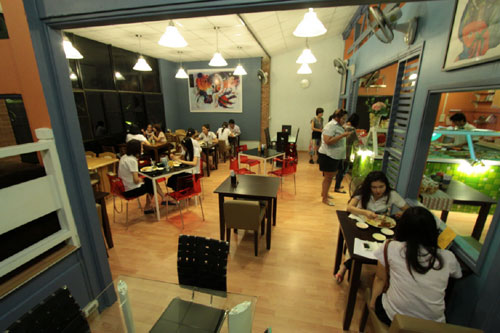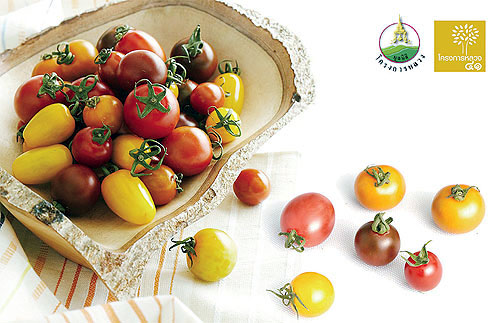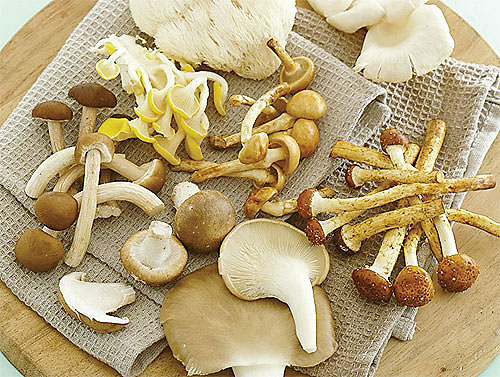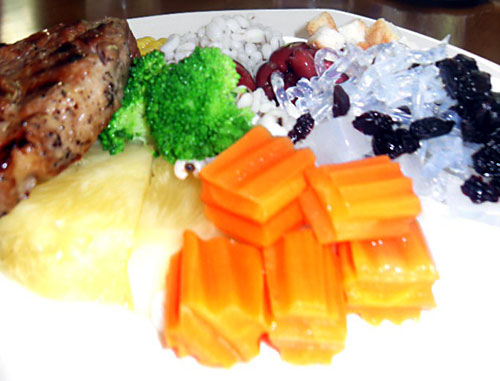|
It is fascinating that Salad was one of the best known Western foods that Thai people welcomed and felt good about eating due the fact that there are some fresh vegetables and fruits from the Royal Project, which tried its best to develop growing methods for foreign vegetables and fruits, and was quite successful. The result is that the eating habits of Thai people especially the new generations are changing.
Formerly, salad was served as an entr├ęe before the main course such as fish or soup but now the majority of customers in salad bars are young teenagers who want to have fit and slim bodies and good health by consuming more vegetables and fruits. Moreover, both Western chain restaurants and Japanese restaurants provide the salad buffet to their customers as a matter of course.
 |
Salad is one of the easiest foods to prepare and can be eaten with any other dishes. People usually prepare it at home because many vegetables and fruits are inexpensive and they can add some meat and egg as well as salad cream or mayonnaise to encourage children to eat more vegetables and fruits. However, the numbers of restaurants that sell salad as a main dish is rising (though they still do not compare with the noodles stands or restaurants that are spread throughout cities). This is a sign that Thai people are beginning to take care of their health by selecting food with low calories and they believe that salad is one of the good choices for a healthy life.
This year, 2010, is the 41st anniversary of the Royal Project. Salad became one of the favorite foods for Thai people throughout the country and it is strongly promoted. The trend of consuming salad in Bangkok is stronger than other provinces. Vegetables and fruits are quite inexpensive and these are the products of the Royal Project. Some can be found in a specific season but many others can be bought in all seasons such as rocket salad which has a good smell and a bit of a hot taste. In addition, there are red beans, barley rice, white beans, water cress, golden needle mushrooms which can spice up the taste greatly. Salad becomes an essential food for new lifestyles and some beauty salons and spas sell salad to their customers.
This past August, The Royal Project Foundation and Central Pattana organised "Royal Project 41," the 41st annual showcase of products from projects under His Majesty the King's royal initiative. Based on the concept of "His Majesty's boundless loving kindness," the fair featured a large variety of merchandise from the sale outlets of His Majesty's personal projects and over 3,000 items from the various Royal Projects were available at special prices.
Among the highlights of the event were unique farm produce such as five-coloured tomatoes - round and globe-shaped beauties in red, yellow, pink, orange and chocolate with juicy, tangy-sweet flesh perfect for eating fresh - mini pumpkins, a good source of cancer-fighting beta-carotene and giant sweet bell peppers which are richer in vitamins A, B1, B2 and C than ordinary sweet bell peppers. Other highlighted products included fresh produce from Royal Project farms around the country, assorted mushrooms, sturgeon, smoked rabbit, fresh trout, green tea-flavoured buffalo-milk yoghurt and Arabica-flavoured cereal chips under the brand, Doi Kham, the Royal Project's brand of processed food products.
 |

The operation of the Royal Project began in 1964 in an effort to decrease the amount of deforestation and opium growing in the North of Thailand. Deforestation destroyed the water source and opium growing is illegal. To encourage hill-tribe people to stop growing opium, the project encouraged and guided them to grow foreign vegetables and fruits instead. After almost 50 years of growing foreign vegetables and fruits in Thailand, salad has become a serious preference for many people.
Soiless (hydroponic) culture is fairly new in Thailand even though it was introduced almost 20 years ago. Mostly, soiless culture has been used only for experimentation. Commercial hydroponics has steadily developed over the past 10 years. Presently, soiless culture is popular with farmers due to advances in culture methods for high production, especially for vegetables, even in areas of poor soil and unreliable water resources.
The majority of hydroponics farms in Thailand employ either nutrient film technique (NFT), deep flow technique (DFT), or the dynamic root floating technique (DRFT). For commercial growers in Thailand, rapid harvest and higher yields with these systems can achieve year-round production of leafy vegetables with up to 16 crops annually. NFT is popular for producing salad crops, which are mainly in tourism areas such as Bangkok, Chiang Mai, Prachuap Khiri Khan, Chonburi, Phuket, and Surat Thani.
People make salad using many kinds of vegetables and fruits as well as many ways of cooking in preparation.Some people prefer to eat raw vegetables while others may like to eat boiled vegetables. Actually it depends on the kind of vegetables and how to cook them properly. Also, many meats can be used to encourage some people or children to eat more vegetables. Salad toppings are hard bread, raisins, cashew nuts and sunflower seeds and they are used to decorate the salad plate. Salad dressing is essential for some people who do not like to eat vegetables and people can choose among salad cream, thousand island, mayonnaise, Caesar dressing, vinegar, olive oil, sesame dressing, and Japanese soy source.
 |
In Chiang Mai, my family and I usually go to a salad restaurant called "Salad Khun Nai". It is located behind the Faculty of Fine Art, Chiang Mai University. The price is not so expensive and the quality of their food is high. The majority of their customers are students. Mol and Jass, the couple who own the restaurant, graduated from Chiang Mai University as well. At first they opened a steak restaurants in Khon Kaen province but later decided to settle down in Chiang Mai and opened a salad restaurant.
They told me that they saw the possibility of doing business here and opened this restaurant six years ago. Recently, they moved to the new location to set up larger restaurant with 90 tables and parking lots. Their business is growing and more importantly, they are proud of the healthy, tasty food they sell and serve.
|




